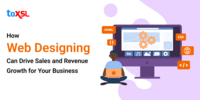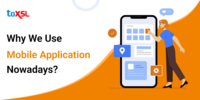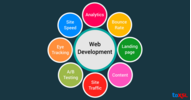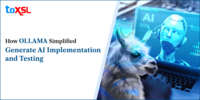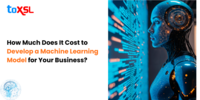- Jan 14, 2026
Share this post on:
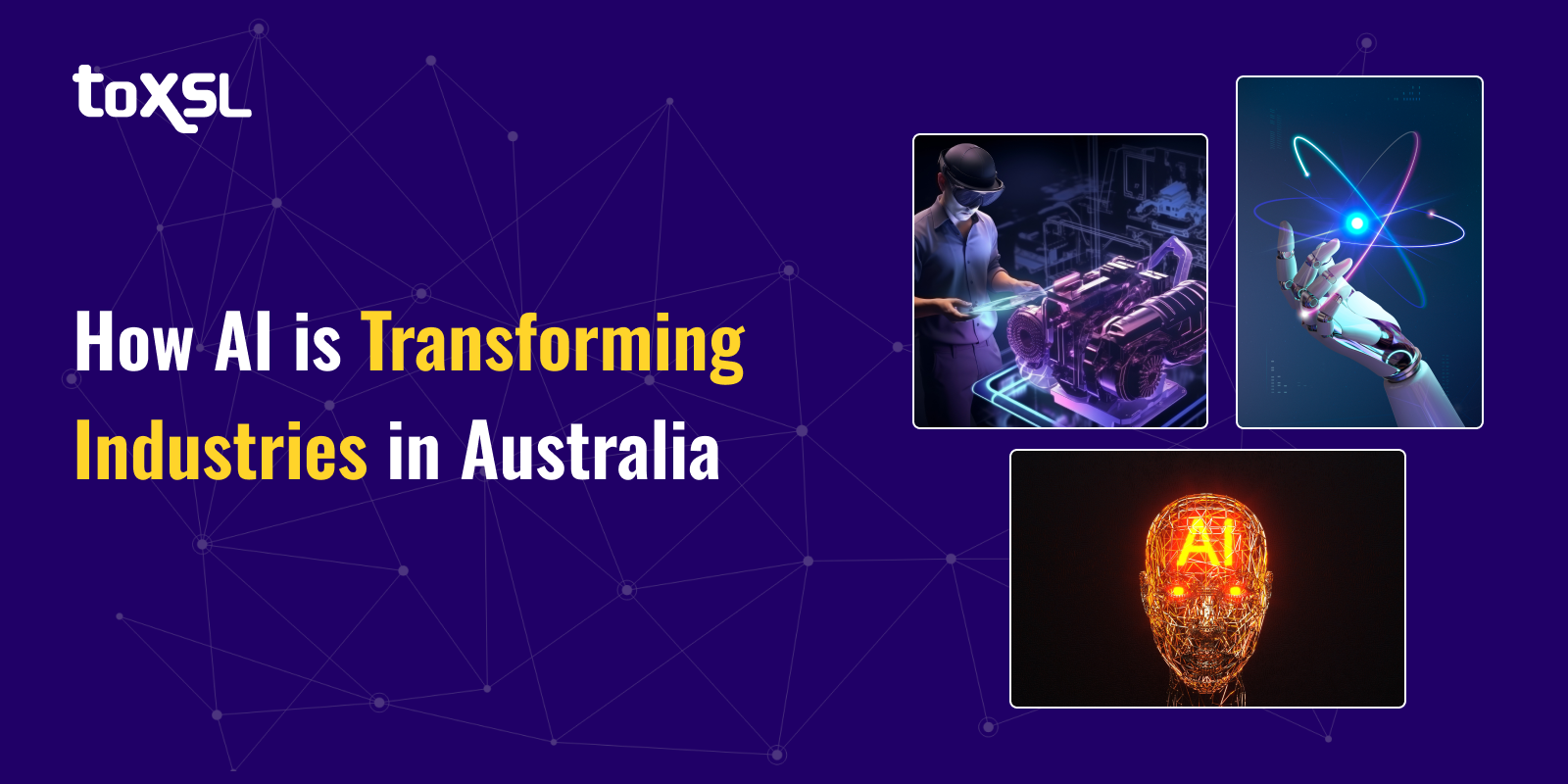
According to Goldman Sachs Research, the ways natural language processing is integrated into businesses and society can lead to a 7% increase in global GDP—approximately $7 trillion—and enhance productivity growth by 1.5 percentage points over the next decade.
Breakthroughs in generative artificial intelligence can significantly transform the global economy. The AI systems can significantly influence employment markets globally. A recent report from CSIRO indicates that 68% of Australian businesses have already adopted Artificial Intelligence (AI) technologies, while an additional 23% plan to implement them within the next year.
AI in Business: Top Use Cases of AI in Business
Artificial Intelligence is used in business to reduce repetitive work and drive efficiencies. According to McKinsey, 72% of businesses have adopted AI in at least one of their business operations. In this section, we will discuss the use cases of AI in business.
1. AI in Content Generation
AI is transforming content creation by automating the generation of articles, reports, and marketing materials. Generative AI tools can analyze existing content, extract relevant details, and produce human-like text tailored to specific audiences. This speeds up content production and ensures consistency, allowing businesses to maintain a steady flow of high-quality content.
2. AI in Customer Support
AI is changing customer support through the implementation of chatbots and virtual assistants. These AI-driven tools provide 24/7 support, handling routine enquiries and freeing human agents to focus on more complex issues. By utilizing natural language processing (NLP), AI can understand customer queries better, predict needs, and offer personalized responses. This leads to improved customer satisfaction and reduced operational costs as AI can manage a high volume of requests efficiently.
3. AI in Marketing
In marketing, AI is used for data analysis, customer segmentation, and personalized advertising. Machine learning algorithms analyze consumer behavior to predict trends and optimize marketing strategies. AI tools can automate email campaigns, recommend products based on past purchases, and even create targeted ads that resonate with specific demographics. This level of personalization enhances customer engagement and increases conversion rates.
4. AI in Sales
AI increases sales processes by providing insights into customer preferences and behaviors. AI helps sales teams leverage AI-driven tools for lead scoring, automating follow-ups, and personalizing communication based on individual customer data, resulting in more efficient sales.
5. AI in Human Resources
AI helps HR streamline recruitment processes by automating resume screening and candidate matching. AI tools analyze job descriptions and candidate profiles to identify the best fits for open positions. Moreover, AI helps businesses enhance employee engagement using custom training programs.
6. AI in Cybersecurity
AI plays a crucial role in cybersecurity. It helps businesses detect threats and respond to incidents in real-time. Machine learning algorithms analyze patterns in network traffic to identify areas that could indicate a security breach. Automated systems respond to threats faster than humans, reducing the potential damage from cyberattacks.
7. AI in Legal Departments
Nowadays, legal departments are adopting AI for contract analysis, legal research, and compliance monitoring. AI tools can easily review large volumes of legal documents quickly, identifying key clauses or potential risks that would take human lawyers much longer to uncover. This not only saves time but also reduces costs associated with legal processes.
8. AI in Finance
AI can handle operations through automated trading systems, fraud detection algorithms, and risk assessment models. A machine learning algorithm analyzes market trends to inform investment strategies and monitor transactions for unusual patterns.
AI in Business: Challenges
Integrating AI in business is a challenging process. In this section, let us discuss the main challenges that businesses face while incorporating AI into their operations:
1. Poor Data Quality
One of the most critical challenges in AI integration is poor data quality. AI systems rely heavily on data to learn and make decisions. If the data is inaccurate, incomplete, or inconsistent, the AI models will produce inaccurate results.
Many organizations struggle with data errors, where information is scattered across different departments and systems, making it difficult to collect and clean the data necessary for effective AI training.
2. Data Privacy and Security
With the increase in the use of AI in business, concerns about data privacy and security also increase. Companies must ensure that their AI systems comply with legal regulations while protecting against potential data breaches. A failure to maintain robust data security can lead to significant financial and reputational damage, making it essential for organizations to prioritize secure practices throughout the AI integration process.
3. Lack of Skills
If you want to develop an AI solution, ensure that your developers are equipped with the right skills. Unfortunately, there is often a lack of skills within organizations to effectively develop, deploy, and manage AI solutions. Many businesses find it challenging to recruit or train employees with expertise in AI technologies, machine learning, and data analytics. This skills gap can slow down the integration process and lead to ineffective use of AI tools, preventing organizations from fully realizing their potential benefits.
What is the Future of AI in Business?
The future of AI in business strategy is poised for transformative changes as organizations increasingly adopt advanced technologies to enhance operations, drive growth, and improve customer engagement. Here’s a comprehensive overview of what lies ahead for AI in the business landscape.
1. Widespread Adoption and Integration
Did you know that as of early 2024, 73% of U.S. companies have integrated AI into various aspects of their operations? This trend is expected to continue, with many businesses recognizing AI as a critical component for maintaining competitive advantage.Generative AI (GenAI), in particular, is leading this charge, with over half of surveyed companies implementing it in some capacity. The ability of GenAI to streamline processes and enhance productivity is making it an essential tool across industries.
2. Generative AI Revolution
Generative AI is set to redefine how businesses operate by automating content creation, improving customer interactions, and enhancing decision-making processes. This technology allows organizations to generate high-quality outputs, from text to images, tailored to specific needs, thereby increasing efficiency and reducing time spent on repetitive tasks.
3. Enhanced Data Utilization
The future of AI will heavily rely on effective data management and utilization. Organizations are increasingly recognizing the importance of data modernization efforts to maximize the potential of AI technologies. By digitizing and centralizing data, businesses can leverage AI’s capabilities to extract insights, forecast trends, and make informed decisions. According to PWC, 44% of business leaders plan to implement data modernization initiatives in 2024 to better harness GenAI’s power.
4. Focus on Responsible AI
As AI technologies become more prevalent, the emphasis on responsible AI practices will grow. Businesses will need to ensure that their AI systems are compliant with regulations and ethical standards while maintaining transparency and trustworthiness. This includes addressing issues related to data privacy, security, and potential biases in AI algorithms. Companies that prioritize responsible AI practices will not only mitigate risks but also foster greater trust among consumers and stakeholders.
5. Collaboration Between Humans and AI
The future will see a shift towards collaborative intelligence, where humans work alongside AI systems rather than being replaced by them. This partnership will enhance workplace productivity by allowing employees to focus on creative and strategic tasks while automating routine processes. The concept of "AI-augmented" roles is gaining traction, emphasizing the complementary relationship between human skills and AI capabilities.
6. Impact Across Industries
AI's influence will extend beyond traditional business functions into areas such as healthcare, finance, manufacturing, and more. For instance, in healthcare, AI is expected to aid in early disease detection and personalized treatment plans, while in finance, it can enhance fraud detection and risk assessment processes. The versatility of AI applications across different sectors underscores its potential to drive innovation and efficiency on a broad scale.
Wrapping Up
Integrating AI across your business can help your business grow to a greater extent. Today, AI tools are helping businesses become remarkably powerful and helping them to advance their business operations. However, companies that fail to explore and implement AI applications might find themselves at a considerable competitive disadvantage. As a leading Artificial Intelligent and Machine Learning software development company in Australia, we have helped numerous clients enhance their business operations by integrating Artificial Intelligence into their businesses. Our team of experts holds many years of experience and starts the development process after understanding the whole business process at a deeper level. They are well-versed with deep learning and machine learning algorithms and have clear understandings of which algorithm to use where, helping them create the most innovative and scalable solutions for our clients.
So, whether you are looking to develop a custom AI solution or a chatbot in Australia, ToXSL Technologies is the best choice. Partner with us and leverage our high-end solution.
Frequently Asked Questions
1. How is AI impacting businesses across different industries in Australia?
AI is helping Australian businesses automate tasks, improve decision-making, and personalize customer experiences. Industries like healthcare, finance, retail, and manufacturing are using AI for faster data analysis, predictive insights, and enhanced efficiency.
2. Which industries in Australia are seeing the most growth due to AI?
Industries such as healthcare, agriculture, logistics, and finance are experiencing rapid AI-driven growth. From medical diagnostics and smart farming to fraud detection and supply chain automation, AI is bringing innovation and productivity improvements across sectors.
3. What are the benefits of adopting AI for companies in Australia?
Companies in Australia benefit from AI through cost reduction, increased productivity, improved accuracy, and smarter customer engagement. AI also helps businesses stay competitive by enabling real-time data processing and better decision-making.


